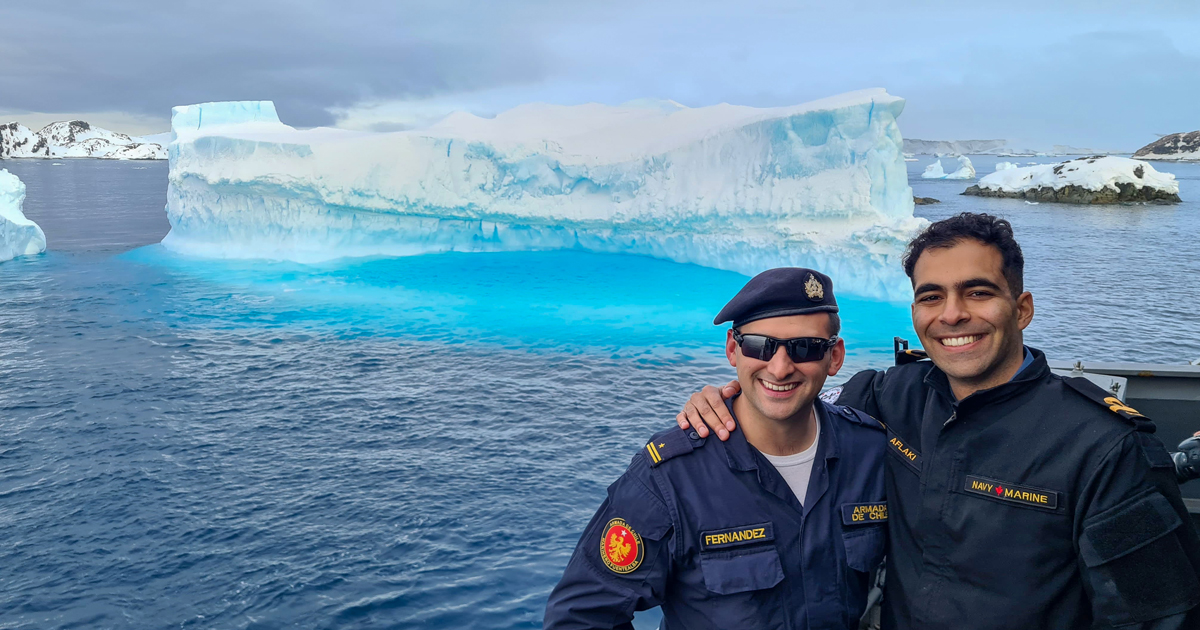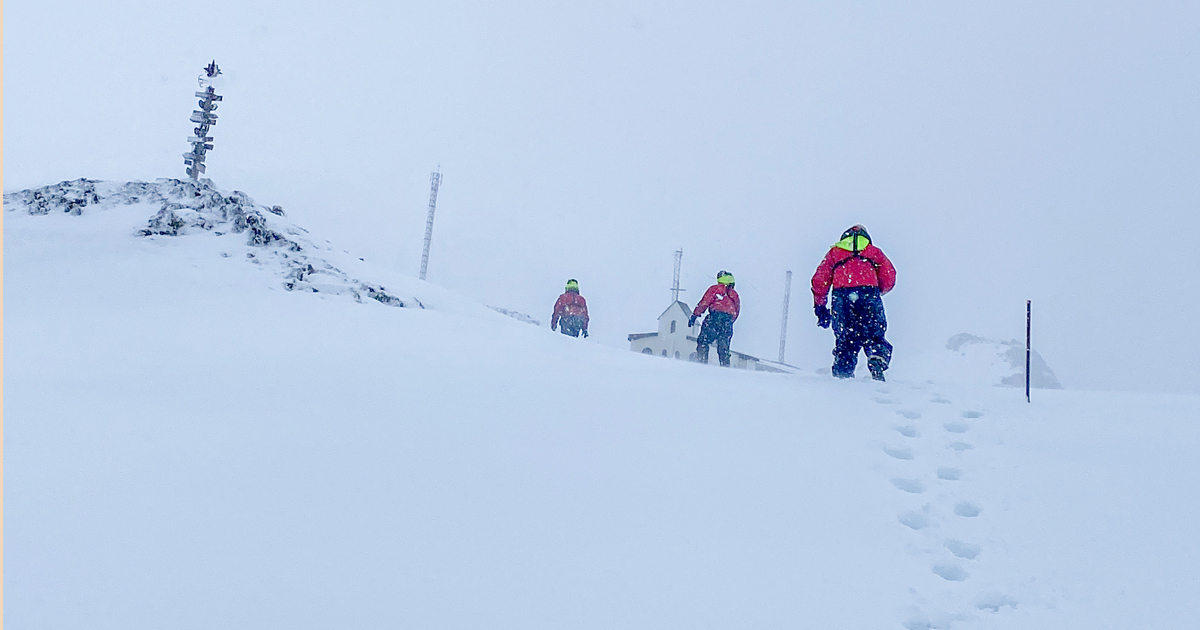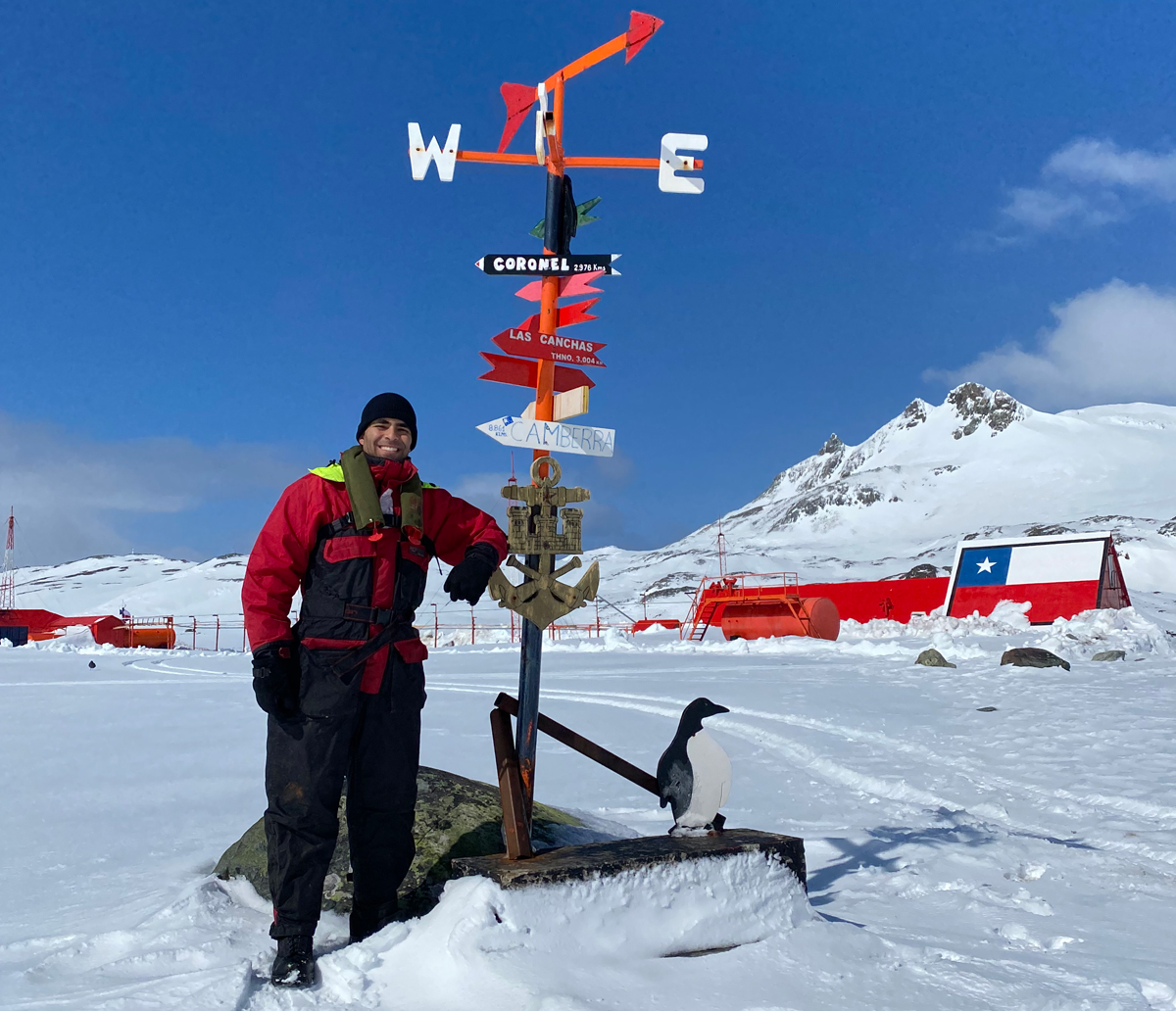RCN sailor traverses the Antarctic waters with the Chilean Navy
By Lookout Production on Feb 13, 2024 with Comments 0

A/SLt Kayvan Aflaki (right) and T2 Francisco Fernandez of the Chilean Navy stand before a glacier as they transit across the Bransfield Strait aboard Marinero Fuentealba en route to complete a replenishment. Photo: ST Felipe Quijarro
A/SLt Kayvan Aflaki,
NWO
This unique opportunity, through a program called Regulus designed to increase at-sea training opportunities, was not just about fulfilling my training obligations or supporting the Chilean Navy’s day-to-day operations; it was an immersive experience in the heart of a frozen world escorting dignitaries on a mission of global importance.

Acting Sub-Lieutenant Kayvan Aflaki and crew members of Chilean offshore patrol vessel Marinero Fuentealba traverse through Villa Las Estrellas on King George Island to deliver essential supplies to a research station. Photo: ST Martin Widow.
Our destination was the Chilean Antarctic Territory, which spans over 1.25 million square kilometres and comprises the area south of 60°S latitude and between longitudes 53°W and 90°W. My journey began by joining the crew of the Chilean offshore patrol vessel Marinero Fuentealba at the southern port city of Punta Arenas in Chile. Over the coming days, our vessel navigated through the Strait of Magellan and across the Drake Passage to Villa Las Estrellas—a small settlement nestled on the shores of King George Island.
Our secondary objectives involved replenishing multiple Antarctic research stations with vital supplies, including rations, fuel, and scientific equipment. The logistical intricacies of this task were as formidable as the icy terrain itself. One standout operation was replenishing two Chilean Antarctic research facilities adjacent to Villa Las Estrellas, Base Presidente Eduardo Frei Montalva and Base Professor Julio Escudero, where the elements seemed to challenge our every move. A violent snowstorm prevented the use of local service roads. Consequently, the crew members and I unloaded our rigid-hull inflatable boat and carried the supply crates using a marked walkway through Villa Las Estrellas. As we trekked through the thick quilt of snow and 25-knot winds, Villa Las Estrellas invoked an unexpected feeling of familiarity. I marvelled at the sense of community that emanated from the shared spaces—a school, a chapel, and the comforting glow, of all things – streetlamps. We were warmly received by a cohort of Antarctic researchers, who welcomed us with hot coffee. The gratitude in their eyes underscored the humanitarian importance of our mission beyond the political spotlight. Without fail, their eyes eventually found their way to the red and white flag on my uniform sleeve. ‘Canadian!’ It carried gratitude and mutual respect.
I was the sole Canadian among the crew on this mission, and at no time was the significance of the flag patch I wore on my uniform lost to me. Nor did it seem to be overlooked by those I encountered. It reaffirmed to me the importance of Canada’s presence as a positive force on the international stage.
Before returning to mainland Chile, I volunteered to assist the crew of Marinero Fuentealba with a final task on our deployment to Antarctica—to locate and restore a monument of national significance to Chile and the Chilean Navy. This was the statue of Piloto Pardo, who famously rescued the Endurance crew after their fateful stranding on Elephant Island in 1916. The ship became trapped in the ice of the Weddell Sea, eventually causing it to sink. Under Sir Ernest Shackleton’s leadership, the crew was left adrift on a floe before Shackleton and a small group embarked on a daring open-boat journey for help. All 28 of the crew survived the ten-month affair. Surrounded by the vastness of Elephant Island, the granite monument stands defiantly amid snow-capped peaks, chinstrap penguins waddling along the rocky shoreline, and the icy expanse of the Southern Ocean—a tribute to the indomitable spirit of exploration and human resiliency. Indeed, repairing the weathered monument was a fitting end to my journey to Antarctica.
My time in Antarctica reminded me that, even in the harshest environments, a semblance of ‘home’ can be found through shared human connections – through the collective pursuit of a higher purpose. The shared endeavour of supporting COP28, replenishing research stations, and restoring Piloto Pardo created an intangible sense of home. In hindsight, I realize that my opportunity to sail with the Chilean Navy was not just about working with our Defence partners; it was about safeguarding our planet—our home—for generations to come. With its grandeur and vulnerability, Antarctica is a call to action, a reminder that the seas, no matter how vast, are within our care. As I reflect on this journey, I am reminded that in the face of environmental and security challenges, unity is not just an option but our lifeline. And Canada has an essential place in the bigger picture.
Kayvan Aflaki is a Naval Warfare Officer undergoing initial training with the Royal Canadian Navy at His Majesty’s Canadian Ship Venture.

A/SLt Kayvan Aflaki stands with a landmark signpost at Captain Arturo Prat Base, a Chilean Antarctic research station located on Greenwich Island, after completing a replenishment with the crew members of Chilean offshore patrol vessel Marinero Fuentealba. Photo: ST Felipe Olea.
Filed Under: News Release • Top Stories
About the Author:





